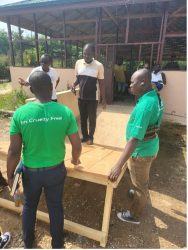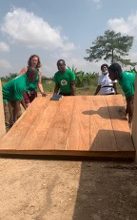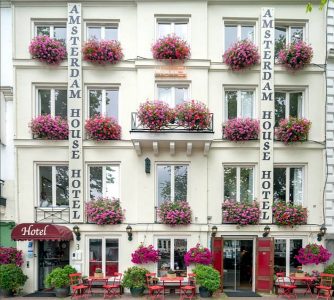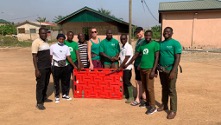
An Eyes on Animals team is back in Ghana. Since 2017 we have been helping (hands-on and financially) the terrific local animal-welfare organization WACPAW (West Africa Centre for the Protection of Animal Welfare) in getting urgent help to animals in Ghanaean slaughterhouses, where the level of suffering is exceptionally high. The slaughterhouse we visited today is called Olives Gbawe and was financed partly by the European Union in the form of a one-off grant.
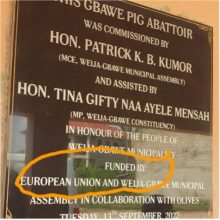
There were some serious mistakes in the design of the plant, and all equipment inside the plant was not in use as they had too high operational costs (everything was Made in China by the company WFA-Machinery and required electricity and high maintenance, so it was left unused). The Chinese WFA electric stunner, bought originally to render pigs unconscious prior to cutting their throats, was only 2 months old but already broken and thus not in use. For this reason the pigs were not rendered instantaneously unconscious prior to slaughter, but were being clubbed repeatedly on their heads until they became immobile.
Like most slaughterhouses in Ghana, this pig slaughterhouse also did not have a suitable unloading ramp. The trucks used to transport animals in Ghana also do not have unloading ramps. This means that pigs arriving are shoved off the trucks and forced to fall down over 1 meter onto concrete pavement. The pigs panic, and many land on their noses, their backs, several seriously injured their legs and could not walk afterwards. We used our red plastic boards to make a temporary ramp to ease the horror but the only long-term solution to this suffering is having a well-designed permanent ramp built. Many arrived dead from the 20-hour journey in direct sunlight, on bumpy roads in 36 degree heat and 85% humidity. Fortunately we import captive bolt stunners to Ghana. One pig was seriously injured and in horrific pain. We were able to give her some water and quickly and humanely put her out of her misery thanks to the captive bolt stunner. We stunned her, she died immediately.
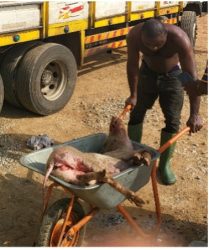

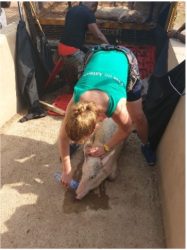
After we had a very productive meeting with the manager and veterinarian, they agreed to have a ramp built, and invited us to come back in a few days to see it. They were very grateful for our help and ideas. Afterwards we were asked us to teach their butchers how to use a captive bolt stunner, as they too do not like to have to resort to a wooden club to beat the pigs to death. They also wanted to learn how to use our red boards to move pigs humanely down the raceway. The practical training went very well and we donated a captive bolt stunner to them, and hundreds of cartridges, so that they could continue to at least render the pigs unconscious prior to slaughter after we leave. WACPAW will remain in touch with them and regularly return in 2023 to make sure standards get better here.
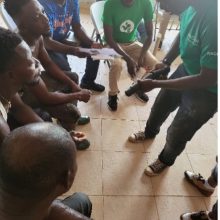
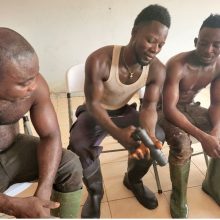
I know it is hard to read but in Ghana, like so many countries in the world, they don’t have easy access to animal-welfare education or stunners. Together with WACPAW we are trying to change this.
We would also like to thank Bob and Charles from the Ugandan NGO The Vegan Village. We invited them to come and learn from our work in Ghana, as they want to help also animals in Ugandan slaughterhouses, where conditions are similar to Ghana. They were an excellent team, providing water and forage that the pigs enjoyed once they entered the lairage. They provided a little bit of comfort to the pigs, who had suffered so much during such a long difficult journey and painful unloading.
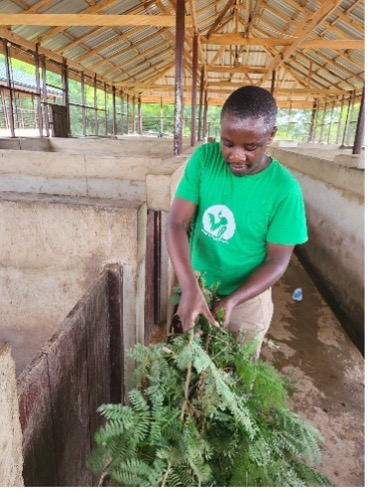
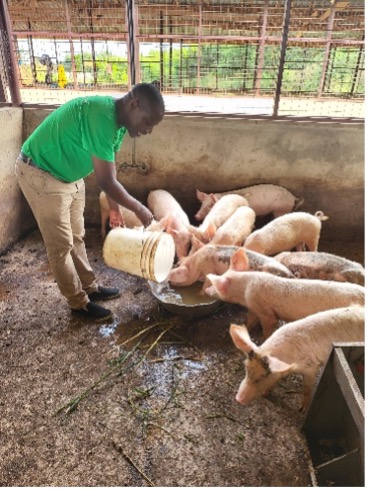
Good News Update Saturday 10.12.2022
The ramp is built and in place! It greatly alleviates some of the fear and suffering the pigs were experiencing previously during unloading from the truck onto the pavement. We now still need to design a ramp to unload the pigs from the second floor of the truck onto the first floor.
